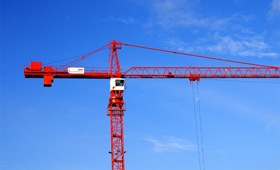BLOG
Top 5 Reasons to Use a Maeda Mini Crane for Handling and Installing Glass Panels
Installing large panels of glass can be a challenging task, especially for those that are not as experienced in the process. Throughout the glass installation process, there are several problems that can arise, and businesses must be aware of them in order to mitigate the risk of injury, downtime, and damage. In this blog post, we’ll be discussing some of the common challenges companies may face when installing large panels of glass, and how to best address them.
Using glass handling equipment like glass handlers and mini cranes is a great way for you to improve efficiency across your projects, while also minimizing your injury and fatigue. These compact and powerful machines are designed to take the stress off your team, as they can significantly decrease the amount of labor required to install glass panels, leading to greater safety and efficiency on the job site.
As Leavitt Cranes is now the authorized dealer for Maeda Cranes in Washington and Oregon, we carry a range of Maeda mini cranes, including their lineup of mini crawler cranes and battery cranes. These compact but powerful machines are engineered to deliver reliable glass and material lifting solutions in both interior and exterior environments. They're ideal for jobs with tight spaces, restricted access areas, and heavy loads such as glass installations and building renovations. Here are a few ways that Maeda mini cranes can help your company attract better employees and improve your glass installation process.
1. Safety
Installing large glass panels can be dangerous work, especially when working at heights or in cramped spaces. Companies must take appropriate safety precautions to protect workers from falls and other accidents. This includes providing appropriate personal protective equipment (PPE), such as fall arrest harnesses and hard hats, as well as training on proper safety procedures
To minimize the injuries that can come with lifting glass, we recommend that you keep in mind the following safety practices: 
Be mindful of the loads' weight
Strap the glass to a rack securely
Use proper hand and body positioning
Stay a safe distance away from machinery
Carry the load on your side with both hands
Be aware of uneven terrain and potential hazards
Wear proper PPE (Personal Protective Equipment)
Know the safety rules and procedures for your work
Use glass lifting equipment like a glass handler or a mini crane to help place large panels and heavier loads
According to NIOSH (National Institute for Occupational Safety and Health), a “load constant” (LC) of 23 kg (about 51 lb) was established as a load that, under ideal conditions, is safe for 75% of females and 90% of males to manually lift. When you begin to exceed these weight recommendations, you’re putting yourself and others at risk. By using the right kind of glass lifting equipment, you can minimize the risk of injuries and damages that can come with manual glass handling, while also increasing your productivity.
Mini cranes are proven to help reduce injuries across the glass installation industry. By reducing the amount of manual labor required to move and position glass panels, mini cranes reduce the risk of accidents, injuries, and damages. Additionally, mini cranes can be operated from a distance, reducing the need for workers to be in close proximity to heavy glass panels.
2. Complete More Projects by Increasing Your Efficiency
Mini cranes can significantly increase the efficiency of the glass installation process. These machines are capable of lifting and moving heavy glass panels with precision and ease, allowing workers to complete installations more quickly and accurately. This can help companies increase productivity, reduce labor costs, and improve their bottom line.
3. Lifting Capabilities Takes the Stress Off of Your Operators
One of the biggest challenges glaziers face when performing glass installation is the physical strain that it can place on workers. Frequently lifting and maneuvering large glass panels over extended periods of time can be extremely taxing on your workers, which can lead to a greater chance of injuries through fatigue.
Injuries from handling glass can include:
Cuts
Fatigue
Scratches
Punctures
Amputations
Broken bones
Muscle strains
Bone fractures
In some cases, death
Another challenge glaziers can come across when dealing with large panels of glass is their handling and transportation. Large panels can be heavy, bulky, and fragile, and must be handled with care to avoid damage. Companies need to ensure that they have the right equipment, such as a mini crane or glass handler to safely transport and position the panels.
By investing in advanced tools and technologies, such as mini cranes, your company can attract better employees who are committed to quality and safety. Workers are more likely to be attracted to companies that prioritize safety and efficiency on the job site, and that are willing to invest in the latest technologies to improve the installation process
4. Eco-Friendly
While many mini cranes run on propane, Maeda mini cranes and Jekko cranes can run on battery, diesel, or electric power. When executing indoor glass installation jobs with a mini crane, you are required to ensure that the equipment in use emits zero emissions.
The Maeda battery crane is an innovative and eco-friendly model that is designed to be highly efficient, allowing you to complete jobs safer and faster. Powered by a lithium-ion battery that can provide up to six hours of continuous operation, this makes it an excellent choice for indoor work in confined spaces where emissions and noise levels need to be minimized. This is preferable for the environment and the health and safety of workers on site.
5. Confined Space Versatility
Mini cranes are versatile machines, as they can fit into areas with restricted access, uneven terrain, and limited headroom. They are able to fit through standard doorways and tight corridors, making them ideal for indoor work.
But don’t just limit these mini cranes to just indoor glass installation projects. Companies can effectively use Maeda’s line of mini cranes on outdoor glazing jobs as well. These mini cranes can install glass panes on large buildings, shopping malls, and roof glazing. They are instrumental in urban areas where construction grows but with limited space.
Find the Right Maeda Mini Crane for Your Glass Installation and Glass Repair Projects
Mini cranes are a valuable tool for companies in the glass installation industry. By reducing physical strain, improving safety, increasing efficiency, and attracting better employees, these machines can help companies improve their bottom line and provide better service to their clients.
We offer a range of versatile and efficient options for businesses in need of lifting and material handling solutions. Whether you require a compact mini crane for indoor work, a powerful and reliable crawler crane for challenging job sites, or an eco-friendly battery crane for confined spaces, Maeda mini cranes will help you get your job done. As your authorized dealer for Maeda cranes, Leavitt Cranes is proud to offer these innovative machines in Washington and Oregon, providing businesses like yours with safe, efficient, and reliable solutions for all their lifting and material handling needs.
ABOUT LEAVITT CRANES
As a leading crane dealer, Leavitt Cranes supports various industries around the world with our extensive selection of cranes. Our inventory features flat-top, hammerhead, and luffing jib tower cranes alongside self-erecting and crawler models. In addition to our selection of new cranes, Leavitt Cranes offers a wide variety of rentals, repair/maintenance services, parts, and training support for every crane in our lineup. With industry-leading brands such as Terex, Kroll, Jekko, Maeda, Broderson, Potain, Butti, and Smartlift we can provide solutions for a variety of operations and applications.
STACK IT | REACH IT | LIFT IT®










